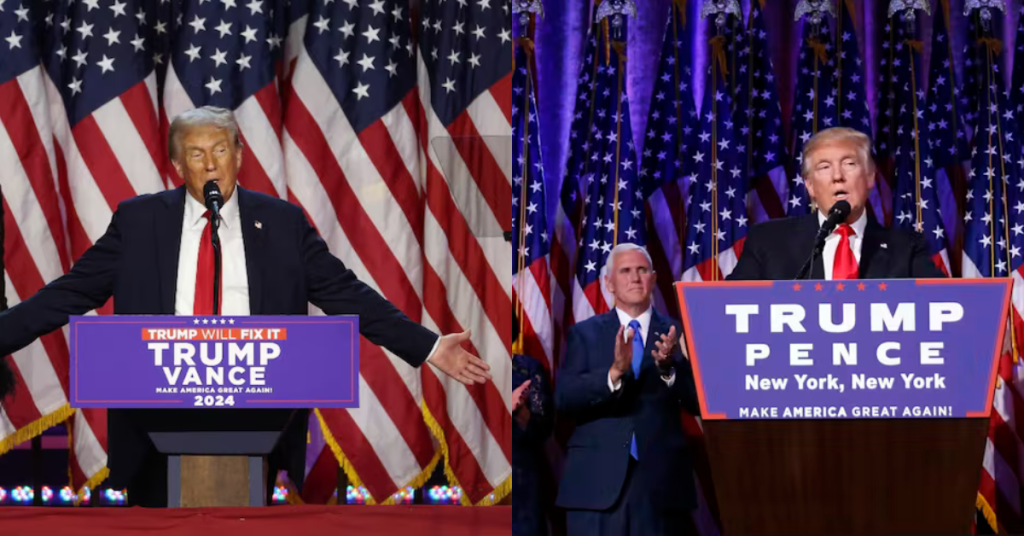The 2024 victory speech by Donald Trump reflects both continuity and shifts from his 2016 speech. Analyzing these can reveal the trajectory of his leadership style, rhetoric, and potential impact on global politics. Here is a comparative overview:
1. Tone and Rhetoric:
- 2016 Speech: Trump’s 2016 victory speech focused heavily on unity and reconciliation, promising to represent all Americans and heal divisions. The speech had a relatively humble tone, aimed at presenting himself as a leader of change and peace.
- 2024 Speech: The tone in 2024 is more assertive and triumphant, with a strong emphasis on overcoming unprecedented obstacles and a bold commitment to “saving” America. The speech carries a heightened sense of personal vindication, evident in statements like “God spared my life for a reason.”
2. Themes of Nationalism:
- 2016 Speech: While nationalistic themes were present in 2016, they were intertwined with a broader message of economic empowerment and infrastructure development. Trump spoke of rebuilding cities and strengthening the American economy, focusing on creating jobs and opportunities.
- 2024 Speech: The nationalism in 2024 takes on a sharper edge, emphasizing not only domestic prosperity but also protectionist measures, such as “sealing up those borders.” There is a direct call to bolster American exceptionalism, as seen in statements like “China doesn’t have what we have” and mentions of “protecting our geniuses.”
3. Acknowledgment of Challenges:
- 2016 Speech: Trump acknowledged the significant challenges the U.S. faced and emphasized teamwork, calling for unity across party lines and pledging cooperation with other nations. The message resonated with optimism and potential collaboration.
- 2024 Speech: Challenges are highlighted differently, portrayed as obstacles already conquered or still needing a decisive leader to address them. His victory is cast as a historic and almost miraculous event: “We’ve made history for a reason tonight,” with a tone suggesting his role as an essential figure in overcoming existential threats.
4. Focus on Policy:
- 2016 Speech: Policy points were vague but implied broad strokes of reform across healthcare, infrastructure, and the economy. He focused more on promises of change without delving into specifics in his immediate post-election speech.
- 2024 Speech: Policy is more defined and direct, including hardline stances on border security and control over legislative power. Statements like “We have taken back control of the Senate” and “It also looks like we will be keeping control of the House of Representatives” show an emphasis on consolidating power to push forward his political vision.
5. International Perspective:
- 2016 Speech: The international outlook was cautiously diplomatic, aimed at reassuring U.S. allies while maintaining an “America First” stance.
- 2024 Speech: The focus shifts to a more confrontational tone. While he praises figures like Elon Musk as symbols of American ingenuity, the comments on “China doesn’t have what we have” suggest an overt comparison with geopolitical rivals. This signals an anticipated escalation in U.S. nationalism and global competitiveness.
6. Personal Reflections:
- 2016 Speech: Trump’s personal reflections in 2016 were limited; he presented himself as a voice of the people, focusing less on his personal journey and more on collective achievement.
- 2024 Speech: The speech is much more personal, particularly with statements like “God spared my life for a reason: To save America.” This suggests an even stronger belief in his role as a unique leader, almost divinely appointed, which could signal a more intense commitment to his ideological platform.
Narrative Impact:
These differences outline a shift from a leader promising change and reconciliation in 2016 to a leader in 2024 portraying himself as essential for national salvation and defense. This evolution in rhetoric could shape U.S. domestic and international relations more decisively:
- Domestically, the sharper and more self-assured tone in 2024 suggests a mandate to enforce more stringent policies, possibly intensifying divisions among political and social groups. The focus on strong security measures could bolster his support among core followers but alienate moderate or opposing voices.
- Globally, the speech hints at potential strains in international alliances, with a marked focus on American superiority and explicit comparisons to nations like China. This could exacerbate geopolitical tensions, influencing economic and military policies worldwide.
In conclusion, while Trump’s 2016 victory speech portrayed a pragmatic approach to bridge differences, the 2024 version heralds a more assertive, almost self-messianic vision of leadership. This change in narrative may lead to more pronounced domestic challenges and reshape global perceptions of U.S. leadership, likely fostering both staunch allies and wary adversaries.




